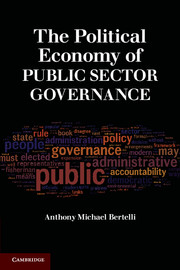Conclusion
Published online by Cambridge University Press: 05 June 2012
Summary
We began our exploration of the political economics of public sector governance by emphasizing the connection between the actions of government and the will of the people as expressed through their elected representatives. This link was the linchpin of democratic governance through responsible public management in the preceding chapter. Responsibility represents the paramount and constant demand of the democratic setting in which public management operates. Because politicians represent citizens and public managers are authorized to perform governance tasks by politicians, this democratic relationship was present in all the theories we covered in this book. Those theories provide a set of propositions that, when taken together, create a framework for thinking about governance. Though the literature we covered was selected from a vast collection of contributions, it reveals the heart of our approach.
That approach requires institutions, the rules and norms that shape behavior. In Chapter 1, we distinguished institutions from organizations, or collections of institutions that enable their members to engage in collective behavior. Mixtures of institutions and organizations create incentive mechanisms – an agreement with your doctor, a job advertisement from the Department of Social Services (DSS), a budgetary appropriation to the Department of Defense, a delegation to the Environmental Protection Agency to establish pollution abatement standards, a contract between the city of Los Angeles and a nonprofit to provide low-income child care, professional ethics, the Program Assessment Rating Tool (PART), or the Comprehensive Performance Assessment (CPA). Incentive mechanisms propelled our analytic strategy throughout the book.
- Type
- Chapter
- Information
- The Political Economy of Public Sector Governance , pp. 166 - 172Publisher: Cambridge University PressPrint publication year: 2012



